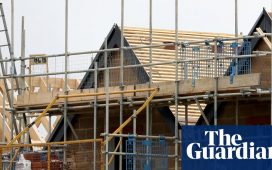Unlock the Editor’s Digest for free
Roula Khalaf, Editor of the FT, selects her favourite stories in this weekly newsletter.
Barratt has cemented its position as the UK’s largest housebuilder after agreeing to buy rival Redrow in a £2.5bn deal, as developers weather the property market downturn.
The boards of both FTSE housebuilders have recommended the all-share merger, which they said would lead to significant cost savings.
The multibillion-pound deal is one of the biggest between two UK-listed companies in the past year and comes as both groups navigate a plunge in sales of new homes caused by higher mortgage rates squeezing prospective buyers.
Housebuilders nationwide have cut costs and reduced the amount of land they are buying as their profits and output plummet. The deal on Wednesday marks the first move to consolidate by two big national developers since the market soured. Vistry struck a £1.25bn deal to buy Countryside in 2022.
Barratt’s chief executive David Thomas, who would lead the combined group, said: “Combining the business is going to offer a broader range of house types and price points.”
Barratt shares fell 5 per cent on Wednesday, while Redrow’s climbed nearly 15 per cent. The deal would see Redrow shareholders receive 1.44 new Barratt shares for each Redrow share. Barrett is the UK’s biggest housebuilder measured by the number of houses built, while rival Taylor Wimpey has the largest market capitalisation.
The combined group will be renamed Barratt Redrow and build roughly 22,000 homes a year. The companies said they expected annual cost savings of £90mn, and combined revenues of £7.5bn.
The companies plan to retain Redrow as an upmarket brand, combining higher-end homes with houses generally marketed towards first-time buyers at Barratt Homes. Barratt also owns the mid-market David Wilson brand, which it acquired in 2007.
Thomas said cost savings were likely to be made by cutting some offices where existing networks overlap. He added that the group wanted to “minimise” any job losses.
Redrow’s chief executive Matthew Pratt will continue to lead the brand and join the board.
The deal requires clearance from the Competition and Markets Authority when the regulator is studying the housebuilding market over issues including land buyers and housing quality. Thomas said he was “very confident” the deal would be signed off.
Steve Morgan, who founded Redrow as a small contractor focused on drainage in 1974 and is still its largest shareholder with a 16 per cent stake, has agreed to support the deal. Morgan, the former owner of Wolverhampton Wanderers Football Club, said he hoped the larger group would “accelerate the delivery of much-needed homes across the UK”.
A big donor to the Conservative party under Boris Johnson, Morgan attacked the government in an interview last spring over concessions to anti-development MPs, saying: “It’s like the government wants to destroy the industry.”
There are some signs of recovery in the market, with UK house prices rising in January for the fourth consecutive month to their highest level since October 2022.
The terms of the deal, which still have to be approved by shareholders, offer a 27 per cent premium over Redrow’s closing share price on Tuesday.
“The all-share nature of the deal is astute, retaining a robust balance sheet,” said Aynsley Lammin, an analyst at Investec, adding that the companies were “complementary in terms of geographies and product mix”.
Redrow last summer said it would close two of its 14 regional divisions and cut at least 100 jobs to “manage overhead” as sales declined. Barratt has reduced its headcount by about 10 per cent through a hiring freeze.
Barratt on Wednesday announced that its output fell 28 per cent to 6,171 homes in the six months to the end of December. Its pre-tax profit dropped 80 per cent to £95mn, due in part to a one-off additional cost of £62mn related to building safety at “legacy properties”.
Lammin said the exceptional costs were likely to have contributed to the fall in Barratt’s share price.
Redrow also reported a large slowdown in trading, but both companies said sales had improved in the first weeks of the new year. The deal is expected to close in the second half of the year.
Last year, there were only two UK public company buyouts that topped $5bn, according to data compiled by the London Stock Exchange Group, as broader UK merger and acquisitions activity fell by a third from the previous year to reach the lowest level since 2009.










